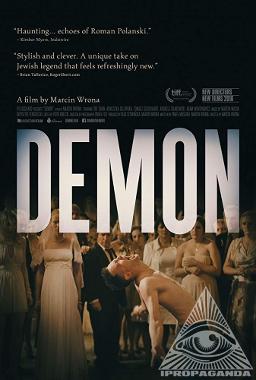
Directed by: Marcin Wrona
Written by: Pawel Maslona, Marcin Wrona
As a boy, laying awake at night wondering what the next day would bring, I would stare into the dark corners of my room, struggling against a growing sense of dread. My eyes grew wider as the sensation grew stronger the longer I dared to look. Eventually, like all of us, I would lose the game of chicken, drifting into dreamland where things either imagined or repressed, took shape, twisting feelings into metaphor. It seems a natural impulse in humans to want to peer deeply into the unknown without being consumed; to question what might exist while denying what we cannot identify with our earthly senses. What secrets are hiding in the dark? What secrets are etched along the folds of one's mind, burning in their heart, pulsing through their being, guiding their hands? Demon is an exploration of that very darkness as it is unknowingly unearthed.
The film follows a young Polish man named Piotr (Itay Tiran) as he travels to meet and wed a young woman, Zaneta (Agnieszka Zulewska), on her family's property in Poland. Sometime before the wedding, while using a backhoe to do some landscaping, Piotr exumes what he believes to be a human skeleton. From there, he begins to lose all sense of himself, seemingly possessed by a vengeful spirit.
What is exceptional about this film immediately is the incredible cinematography by Pawel Flis and editing by Piotr Kmiecik. As the story progresses the narratives run parallel to one another in opposite directions, spiraling deeper before converging at the bottom of an abyss. The further along we get into the night, the more layered the cinematography becomes, making full use of it’s limited scenery to infuse the density of the story into the expression of its image.
Piotr’s introduction to the small village, in which Zaneta’s family is very well regarded, is thrown off by what appears to be an exorcism ritual along the shore. A foreboding sign of what’s to come or a religious form of therapy for a mentally ill woman? Does it matter which idea is true or does one’s perception of an event shape the truth? The film’s themes are married to its expression through the composition of each shot, their rhythm in editing and most importantly, the sound design. What starts out as a jovial occasion becomes an exercise in tension as every move Piotr makes fills the viewer with anxiety. The silence of a crowd waiting to hear his speech may as well be the calm before a storm. The performances are striking as the wedding ceremony dissolves around this family. Even more so is the tragedy of this village, the hurt that had befallen them at the hands of powerful men, the continued cycle of oppression through generations highlighted in this story and the fact that it all happened before their very eyes. This is continually reinforced by Zaneta’s Father’s (Andrez Grabowski) consistent berating of Zaneta’s brother Jasny (Tomasz Schuchardt) for introducing her to Piotr, while the entire immediate family attempts to get the party so drunk they won’t be able to recollect the nights events. They’re manipulative, horrible people, played perfectly by everyone involved.
This film does what great possession/ supernatural horror films have always done, which is cloud the perception of the paranormal with the skepticism of reality. The likelihood that someone, in a modern context, would jump to the conclusion of demonic possession to explain irrational behavior or a psychic break rather than any other myriad of scientifically founded illnesses is slim. However, that’s exactly the kind of dialogue that a film like this needs to establish with viewers to create a realistic connection. The varying ideas about what has happened to Piotr coupled with the constant denial by the members of the family to acknowledge the existence of an otherworldly presence is both realistic as well as telling of their characters. Likewise, the drunk Doctor (Adam Woronowicz) being unable to diagnose Piotr is the exact kind of commentary necessary to keep the questions surrounding his mysterious illness alive on both sides of the argument.
What becomes more important than whether Piotr is literally possessed are the implications of his possession. If what Piotr claims is true, what does that mean for this family? The atmosphere, though at times appropriate for a wedding always feels like there is something lurking just beneath the surface, waiting to burst forth, screaming secrets to a room of strangers. Scenes of Piotr’s possession overtaking him among the partygoers are highly disturbing. His performance cannot be understated. It is a wonderfully layered disruption of every perception of normalcy established by tradition and enforced by fear.
Masterfully done.
I would hate to ruin anyone’s experience by continuing to gush so I’ll close.
This is an exceptionally well made film that understands how to imply rather than state, how to suggest instead of push, with standout performances, haunting cinematography and a grounded screenplay that leans into the theatricality of the premise without exploiting the realism of the tragedy. This film is like finding yourself staring into the dark, mesmerized by it, afraid and curious, almost sure there’s nothing there...almost.
I would highly recommend Demon.

